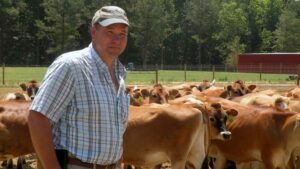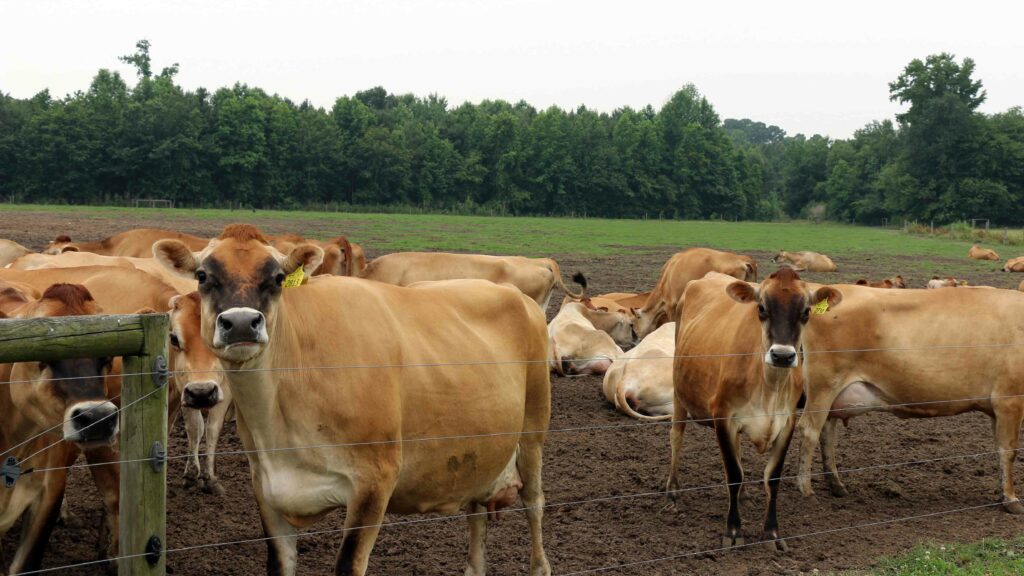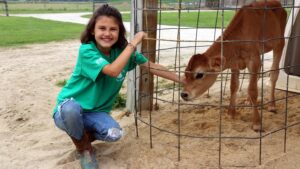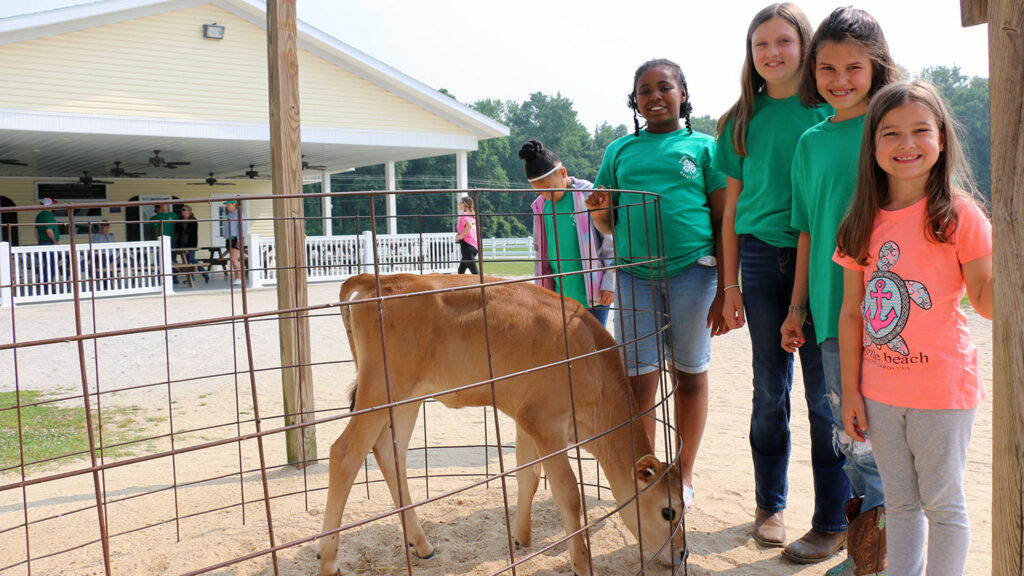NC State Extension Helps a Farmer Launch a Successful Dairy
go.ncsu.edu/readext?944750
en Español / em Português
El inglés es el idioma de control de esta página. En la medida en que haya algún conflicto entre la traducción al inglés y la traducción, el inglés prevalece.
Al hacer clic en el enlace de traducción se activa un servicio de traducción gratuito para convertir la página al español. Al igual que con cualquier traducción por Internet, la conversión no es sensible al contexto y puede que no traduzca el texto en su significado original. NC State Extension no garantiza la exactitud del texto traducido. Por favor, tenga en cuenta que algunas aplicaciones y/o servicios pueden no funcionar como se espera cuando se traducen.
Português
Inglês é o idioma de controle desta página. Na medida que haja algum conflito entre o texto original em Inglês e a tradução, o Inglês prevalece.
Ao clicar no link de tradução, um serviço gratuito de tradução será ativado para converter a página para o Português. Como em qualquer tradução pela internet, a conversão não é sensivel ao contexto e pode não ocorrer a tradução para o significado orginal. O serviço de Extensão da Carolina do Norte (NC State Extension) não garante a exatidão do texto traduzido. Por favor, observe que algumas funções ou serviços podem não funcionar como esperado após a tradução.
English
English is the controlling language of this page. To the extent there is any conflict between the English text and the translation, English controls.
Clicking on the translation link activates a free translation service to convert the page to Spanish. As with any Internet translation, the conversion is not context-sensitive and may not translate the text to its original meaning. NC State Extension does not guarantee the accuracy of the translated text. Please note that some applications and/or services may not function as expected when translated.
Collapse ▲When others were zigging, Neil Moye zagged. He and his brother, David, were successful row crop farmers, and their livestock operations were doing well. But about 15 years ago, he began to think about further diversifying the family farm in Greene County.
He looked around, and noticed a lack of dairies.
“Dairy had left this part of the world years ago,” Moye said.
On the one hand, there seemed to be an opportunity. On the other hand, there was a reason for the lack of dairies. Namely, it was increasingly difficult to make a profit.
“When I started talking about starting a dairy, I mean I got some crazy looks,” Moye said. “My thing was, well there’s nobody here doing it.”

Simply Natural Creamery and Jersey Farm owner Neil Moye credits NC State Extension with helping him start his dairy.
He knew nothing about running a dairy, but he did know where to turn for help. He called NC State’s Extension agent in Greene County, who in turn brought in reinforcements. Statewide dairy agent Marti Day, Dr. Steve Washburn, then an Extension specialist working with dairy production systems, and an NC State economist paid a site visit.
“Three of them came down and we met at my office at the farm,” Moye said. “I said that I wanted to consider getting into the dairy business. My goal was to get the dairy up and running and then I wanted to do on-farm processing where we could go directly to the consumer.”
NC State Extension exists to extend research-based knowledge to people across the state, and to offer practical solutions to local issues. That includes providing expert advice to anyone thinking about becoming a farmer, and farmers like Moye who are looking to expand and diversify their operations.
The advice is based on the latest science, research and technology. It is also clear-eyed and realistic, with frank discussions of market conditions, likely outcomes, and expectations. In Moye’s case, that included making sure he knew why there was a lack of dairies.
“At the time a lot of dairy farms were in transition, either getting bigger, finding a niche, or going out of business,” Day said. “I told him jokingly he needed a psychiatrist, not a farm advisor.”
The latter is said in Moye’s hearing. It gets a hearty laugh. It’s easy to joke about it now that Moye turned his vision into Simply Natural Creamery & Jersey Farm, a very successful operation. People come from miles away to visit the dairy in rural Greene County, to enjoy some of the world’s best ice cream, to buy milk and butter, to take farm tours, and to give the kids an opportunity to pet a calf and play in Sally’s Dairyland.
The herd is about 400 cows, with about half of them being milked on a daily basis. The farm distributes dairy products to a 75-80 mile radius.
“We process about 10,000 gallons of milk a week,” Moye said. “We say that our milk is a one-source milk. When it leaves here it’s going to somebody’s store or somebody’s table.”
In addition to the original on-site creamery outside Ayden, there are locations in Greenville and Morehead City. The ice cream is so popular it was nominated as one of USA Today’s 10 best ice cream shops in the nation.
“It’s way bigger than I expected,” Moye said. “When I first started I thought about a little store with a little processing plant in the back and people would come here and get their fluid milk.”
It wouldn’t have been possible without the help of NC State Extension.
Related: North Carolina Dairy Industry is Grade A
“Extension was a big help getting us up and going from the start,” Moye said. “We had no dairy experience at all. We were row crop farmers. We had tons of questions. We were high on questions and very low on knowledge. Any question that I had pertaining to dairy, if they couldn’t help me they would steer me to someone that was in the industry that could.”
Getting them started on the right foot included making sure they knew the potential risks.
“They told me that it was doable,” Moye said. “It wasn’t exactly a pretty picture they painted, but it didn’t scare me off anyway.”
He wasn’t scared off even though he was planning a herd of a few hundred and the economist suggested he’d need several thousand to make it profitable.
“He just didn’t know Neil,” Day said. “He didn’t know Neil could make it work no matter what size operation. In the dairy group we had never worked with Neil and his family. The crops people were well familiar with their very businesslike approach to farming. The dairy team was teaching what we called the Dairy Wise program. It was Managing for Success, teaching farmers to behave like managers, not employees. Before the economics of dairy farming became so tight it was just the lifestyle. You just worked hard and everything worked. As things tightened up it just didn’t work that way anymore. You had to really be business-minded, you had to manage things. Neil knew how to do that.”
Crunching the numbers suggested that success meant a large herd of Holsteins producing a tanker load of milk a day that would be sold to and managed by a milk marketing cooperative. That, though, was not Moye’s vision.
“The economics were more focused on a larger dairy setting, like a 5,000-cow dairy that was just going to produce milk and ship it,” he said. “I didn’t want to milk 5,000. What I wanted to do was kind of a niche market. At that time not a lot of on-farm processing was going on in the state.”
Moye was ahead of the curve in envisioning a direct-to-consumer business that would double as an agritourism destination. He was also forward-thinking in going with an all-Jersey herd when Holsteins were the dominant dairy breed.

Jersey’s produce milk that is high in butterfat content, ideal for making the delicious ice cream sold at Simply Natural Creamery.
Holsteins typically produce 10-12 gallons of milk a day. Jerseys, along with Guernseys and Brown Swiss, don’t produce as much but their milk is denser in nutrients, including calcium, protein, phosphorus and vitamin B12. They also have higher butterfat content, which adds to the flavor profile.
“In the last 5-10 years, the trend has been towards consumers, not backing off from dairy, but changing from milk to higher-fat dairy products, ice cream, butter, cheese,” Day said. “Neil was definitely ahead of the curve on noticing that Jersey milk was going to be the thing.”
Related: An interactive guide to the breeds at NC State’s Howling Cow Dairy
Nutritious milk and flavorful ice cream weren’t the only reasons Moye chose Jerseys. Research showed them to be a heat-tolerant breed with high conception rates in warm, humid climates, which made them well suited for summers in eastern North Carolina. They are also smaller than Holsteins, an important consideration because he wanted his children involved in the dairy.
“I wanted small-framed, easier-handling cattle for my kids to work with,” he said. “There were several reasons that we kept coming back to the Jersey cow.”
Simply Natural started milking cows in October 2011. The on-farm processing and sales were up and running three years later. He no longer needs as much expert help as in the beginning, but Moye remains involved with Extension. He supplies heifers for Extension’s 4-H dairy programs, and hosts groups at the farm.
In June, youth and parents from Warren County received a tour of the operation. They saw the cows in the field, the acres of corn the Moyes grow for silage, the milking parlor, and were able to pet some cute calves and sample the tasty ice cream.

A member of Extension’s 4-H dairy team from Warren County meets a Jersey calf on a field day at Simply Natural Creamery in Greene County.
“We like to take them to a working dairy farm, let them see what goes into producing the milk they drink,” said Matthew Place, NC State’s livestock and field crop Extension agent in Warren County. “Dairies are dwindling in our area. Most of them have never seen a working dairy farm. We hope the kids not only have fun, but gain a true appreciation for what agriculture does for them. I tell them thank a farmer every chance you get. Whether it’s the clothes on your back or the food you eat three times a day, you need them.”
Extension’s 4-H dairy team in Warren County also has the opportunity to work with six heifers purchased from Simply Natural last year. The calves are kept at a farm owned by Jimmy Harris, a veteran cattleman who raises Black Angus. At the end of the project they will be sold to homesteading families.
Related: Learning Life Lessons Through 4-H Dairy Projects
In July, 4-H dairy show participants from Greene and surrounding counties will go to Simply Natural to learn about cows and to practice showing heifers. On competition day, Moye will haul the calves to the location of the show so the youth can display what they have learned before judges.
“They learn all about ruminant nutrition and digestion, and all the cow parts,” Day said. “Most of the kids who do these projects do not live on farms. It’s a neat project.”

Members of the Warren County 4-H dairy program enjoy a field day at Simply Natural Creamery. Farm owner Neil Moye also provides heifers for 4-H dairy teams in Greene and surrounding counties.
It’s important to Moye, not just to give back to the organization that helped him at the beginning but to give kids an opportunity to experience farm life.
“Kids really don’t have the farm experience anymore,” he said. “I think it really helps to get some responsibility at a young age. It helps teach them that there’s something out there other than sitting at home playing video games or being on their phones all the time.”
Day greatly appreciates Simply Natural’s role in the 4-H program. It’s also gratifying to know that, in an era when the industry is under pressure, NC State Extension helped launch a successful dairy.
“We’ve got less than 150 dairies in the state,” she said. “It’s becoming harder and harder. There are development pressures. It’s not only hard to farm, but you have higher tax rates and the temptation that somebody wants to come buy your land. It’s good to see Neil and his family doing well.”

